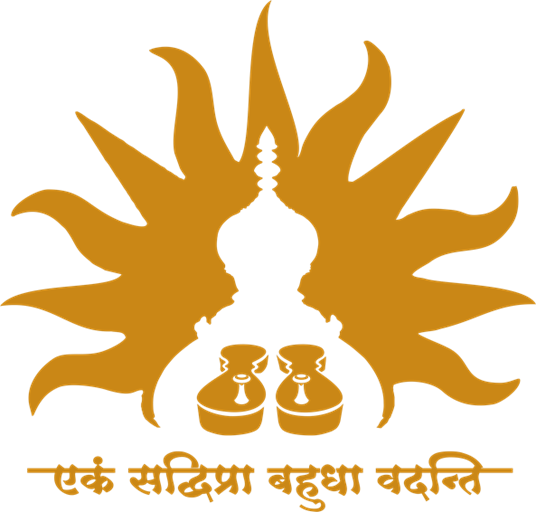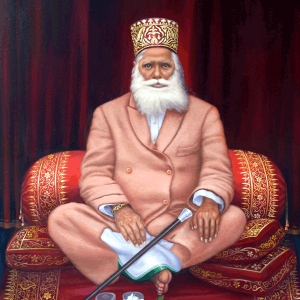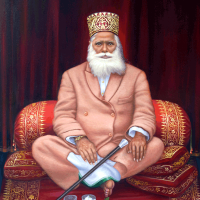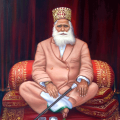Shri Martand Manik Prabhu Maharaj, born on 28th December 1861, was the younger son of Shri Narasimha Tatya Maharaj. He imbibed in him the best of his immediate predecessors, his elder brother, Shri Manohar Manik Prabhu Maharaj and his uncle, Shri Manik Prabhu. He had reached the pinnacle of spiritual sadhana. He had an in-depth understanding of the purpose and mission of Shri Prabhu’s work and an incomparable ability to effectively convey to the masses the essence of Shri Prabhu’s message. He also had an unparalleled command over the Shastras. Through his masterly poetic compositions and writings, he elucidated the principles of Advaita Vedanta, which formed the basis of Shri Prabhu’s teachings.
It can be rightly said that each of the successors of Shri Prabhu possessed the Shakti or the Divine Energy of Shri Prabhu further to enhance the glory of the Sampradaya as its torchbearer. Shri Manohar Manik Prabhu consolidated and made the pedestal strong and lasting in a very short time. Shri Martand Prabhu, in his 58-year-long stint as the third acharya of Prabhu’s illustrious peetha, developed the Samsthan into a premier spiritual institution revered by all across divides.
In his extensive writings on Vedanta, Shreeji (as the acharyas of the peetha were reverentially and affectionately called by the devotees) explained the most complex Vedantic principles most simply and effectively in a manner that could instantly appeal even to a layman. Consequently, in his book Dnyan Martand, which was his magnum opus, even while explaining the Sakalamata Sampradaya, he gave vocal expression to his universal vision. In this seminal work, he asserted that any seeker with a deep and sincere yearning for Moksha (liberation) is eligible to study Vedanta. This position was indeed a courageous and revolutionary stand, in contrast to the rigid traditional view regarding the eligibility to study Vedanta.
Learned thinkers spoke about the lucidity of his expositions. The pandits of Varanasi hailed him as ‘Abhinava Shankaracharya’ (modern-day incarnation of Shankaracharya). He was a tireless writer in Marathi, Hindi and Kannada. His abhangas are full of philosophical truths. His other books, Guru Sampradaya, Mahamauna Shataka and Manik Nirvikalpabodha, have proved immensely beneficial for the followers of the Sampradaya to understand its true values.
Shri Martand Prabhu had exceptional command over Mantra Shastra, which he utilised to alleviate the sufferings of Shri Prabhu’s devotees. He was unparalleled across the country in terms of his deep understanding and careful application of Mantra Shastra and Yoga Shastra for the good of the common people.
He was not content to sit in an ivory tower and contemplate the Eternal Brahman. He was concerned with the common people’s lives and the travails they were facing. He travelled throughout the length and breadth of the country to propagate Shri Prabhu’s message, which would lift the people from the misery of Samsara. People were awestruck by his imposing personality and his words of wisdom.
Shreeji was extremely caring, loving and affectionate towards all of Prabhu’s devotees. His awe-inspiring persona and gentle nature instantly struck a chord with those who encountered him. During his era as the peetadhipati of Shri Prabhu’s Samsthan, people across the country became ardent followers of Prabhu’s Sampradaya. Shreeji’s impact on their hearts made them staunch devotees of Prabhu for generations to come.
Shri Martand Manik Prabhu was the perfect embodiment of Samanvaya–equipoise. His entire life bears testimony to this fact. His temporal life and the problems it brought him did not disturb his inner composure or peace. He was a perfect Jnani. As mentioned in the Gita (II.56), ‘He whose mind is untroubled amid sorrows and is free from eager desires amidst pleasures, he, from whom passion, fear and anger have passed away, he is called a sage of settled intelligence (Stithaprajna)’.
Shreeji had an infinite capacity to devote his entire life to the Sampradaya. He took as much interest in the temporal matters of Maniknagar as he did in enabling the devotees of the Sampradaya to achieve their spiritual aspirations. Such was his personality that people were drawn to him and dedicated themselves totally to the service of Prabhu Samsthan. During his time, he undertook extensive development and construction work to enhance the splendour of Prabhu’s abode.
Shreeji was himself a proficient musicologist who had mastered the art of using music as a means to seek union with the Divine. He was also a great patron of Indian classical music. Great maestros of the time, such as Pandit Vishnu Digambar Paluskar, Ustad Abdul Kareem Khan Saheb, Ustad Rahmat Khan Saheb, Gauhar Jaan and Pandit Bhaskar Buva Bakhale, all musical doyens of the highest calibre, performed before him and were honoured by him. Upcoming musicians used to throng to him for his encouragement and blessings. We can catch a glimpse of his musical genius through his numerous Vedantic compositions, which he set to music and sang with utmost devotion and fervour at Maniknagar.
The Nizam of Hyderabad had links with Shri Manik Prabhu Samsthan since Shri Prabhu’s time. These links were further strengthened during the tenure of Shri Martand Manik Prabhu as the Peethadhipati of the Samsthan. The 7th Nizam of Hyderabad, Meer Osman Ali Khan, specially invited Shri Martand Prabhu to Hyderabad and sought his blessings. The then Prime Minister of Hyderabad State, Sir Kishan Prashad Bahadur, an ardent devotee of Prabhu, composed several Urdu couplets describing the greatness of Shri Martand Prabhu.
Shri Martand Manik Prabhu had two sons and one daughter. His elder son, Shri Narasimha Babasaheb Maharaj, was a great scholar of Vedanta and an able administrator. Under the guidance of his father, he worked tirelessly for the development of the Samsthan as its Secretary. His younger brother, Shri Mahipati Bhausaheb Maharaj, who was equally capable, assisted him in the administration of the Samsthan. Unfortunately, both left for their heavenly abode during Shri Martand Prabhu’s lifetime. Anyone else would have despaired, but Shreeji saw the Divine Will in these events.
After Shri Babasaheb Maharaj’s untimely demise, Samsthan’s administrative matters came to be handled by Shreeji’s nephew (sister’s son), Shri Shankarrao Dikshit. Shreeji had paternal love for this promising youth. He had great faith in him, and all the affairs of the Samsthan were left to his supervision whenever Shreeji was on tour. Shankarrao had shown excellent administrative ability and a keen interest in spiritual matters when it came to disseminating the Vedantic principles on which Prabhu’s philosophy rested. Thus, in him, Shri Martand Prabhu saw a fitting torchbearer to the grand spiritual mission of Shri Prabhu and a true leader who could take the Samsthan’s affairs forward.
On Thursday, 12th March 1936, Shreeji left the mortal realm and became one with the divine form of Shri Prabhu. For his devotees, he continues to inspire, guide and bless through the thick and thin of their lives.




